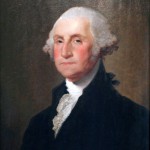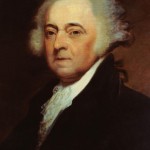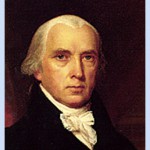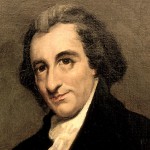[This was first posted October 16, 2012; contributed by Sinaite ELZ@S6K who has since passed away:
We revive it this November where two holidays are celebrated in the USA: Veterans Day and Thanksgiving.—Admin 1.]
———————–

Image from www.pinterest.com
Absolute freedom of worship and religious practice was one of the greatest gifts of the Founding Fathers of the United States to the American people. It is interesting to note that many among them have religious beliefs, practices, and intentions that reflect their unwillingness to accept certain basic principles of the Christian faith.
Some of the Founding Fathers, often called “deists,” believe in God, referring to him as “Providence”. They were religious and morally good men, but their ways of thinking about God and human life differed from orthodox Christianity as the following statements taken from E. Bauman’s “God of our Fathers” clearly show:
1. George Washington

Image from www.gageacademy.org
I now make it my earnest prayer that God would have you and the State over which you preside, in his holy protection, that he would incline the hearts of the citizens to cultivate a spirit of subordination and obedience to government; to entertain a brotherly affection and love for one another, for their fellow citizens of the United States at large, and particularly for their brethren who have served in the field; and, finally, that he would be most graciously pleased to dispose us all to do justice, to love mercy, and to demean ourselves with that charity, humility, and pacific temper of mind, which were the characteristics of the Divine Author of our blessed religion, and without a humble imitation of whose example in these things we can never hope to be a happy nation. (From a circular letter to the governors of the states, June 8, 1783)
I consider it an indispensable duty to close this last solemn act of my official life by commending the interests of our dearest country to the protection of Almighty God, and those who have the superintendence of them, to his holy keeping. (Address to Congress, Dec. 23, 1783)
Disposed, at every suitable opportunity to acknowledge publicly our infinite obligations to the Supreme Ruler of the Universe for rescuing our country from the brink of destruction; I cannot fail at this time to ascribe all the honor of our late successes to the same glorious Being. (Nov. 27, 1783)
If I could have entertained the slightest apprehension, that the constitution framed in the convention, where I had the honor to preside, might possibly endanger the religious rights of any ecclesiastical society, certainly I would never have placed my signature to it; and if I could now conceive that the general government might ever be so administered as to render the liberty of conscience insecure, I beg you will be persuaded, that no one would be more zealous than myself to establish effectual barriers against the horrors of spiritual tyranny, and every species of religious persecution. For you doubtless remember, that I have often expressed my sentiments that every man, conducting himself as a good citizen, and being accountable to God alone for his religious opinions, ought to be protected in worshipping the Deity according to the dictates of his own conscience. (May, 1789)
It would be peculiarly improper to omit in this first official Act, my fervent supplications to that Almighty Being who rules over the Universe, who presides in the Councils of Nations, and whose providential aids can supply every human defect, that his benediction may consecrate to the liberties and happiness of the People of the United States, a Government instituted by themselves for these essential purposes …
2. John Adams

Image from en.wikipedia.org
I must be a very unnatural son to entertain any prejudices against the Calvinists, or Calvinism, according to your confession of faith; for my father and mother, my uncles and aunts, and all my predecessors, from our common ancestors, who landed in this country two hundred years ago, wanting five months, were of that persuasion. Indeed, I have never known any better people than the Calvinists. Nevertheless, I must acknowledge that I cannot class myself under that denomination. (July 8, 1820)
Ask me not, then, whether I am a Catholic or Protestant, Calvinist or Arminian. As far as they are Christians, I wish to be a fellow-disciple with them all. (Jan. 21, 1810)
It is the same vanity which gave rise to that strange religious dogma, that God elected a precious few (of which few, however, every man who believed the doctrine is always one) to life eternal, without regard to any foreseen virtue, and reprobated all the rest, without regard to any foreseen vice. A doctrine which, with serious gravity, represents the world as under the government of humor and caprice, and which Hottentots and Mohawks would reject with horror. (April 22, 1761)
Even since the Reformation, when or where has existed a Protestant or dissenting sect who would tolerate a free inquiry? The blackest billingsgate, the most ungentlemanly insolence, the most yahooish brutality is patiently endured, countenanced, propagated, and applauded. But touch a solemn truth in collision with a dogma of a sect, though capable of the clearest proof, and you will soon find you have disturbed a nest, and the hornets will swarm about your legs and hands and fly into your face and eyes. (1814)
I hate polemical politics and polemical divinity as cordially as you do, yet my mind has been involved in them for sixty-five years at least. For this whole period I have searched after truth by every means and by every opportunity in my power, and with a sincerity and impartiality, for which I can appeal to God, my adored Maker. My religion is founded on the love of God and my neighbor; on the hope of pardon for my offences; upon contrition; upon the duty as well as the necessity of supporting with patience the inevitable evils of life; in the duty of doing no wrong, but all the good I can, to the creation, of which I am but an infinitesimal part. (July 13, 1815)
The great and Almighty author of nature, who at first established those rules which regulate the world, can as easily suspend those laws whenever his providence sees sufficient reason for such suspension.
3. Thomas Jefferson

Image from en.wikipedia.org
Our particular principles of religion are a subject of accountability to our God alone. I inquire after no man’s, and trouble none with mine; nor is it given to us in this life to know whether yours or mine, our friends or our foes, are exactly right. (Sept. 26, 1814)
I have ever thought religion a concern purely between our God and our consciences, for which we were accountable to him, and not to the priests. I never told my own religion, nor scrutinized that of another. I never attempted to make a convert, nor wished to change another’s creed. I have ever judged of the religion of others by their lives, and by this test, my dear Madam, I have been satisfied yours must be an excellent one, to have produced a life of such exemplary virtue and correctness. For it is in our lives, and not from our words, that our religion must be read. (Aug. 6, 1816)
I hold the precepts of Jesus, as delivered by himself, to be the most pure, benevolent, and sublime which have ever been preached to man. I adhere to the principles of the first age; and consider all subsequent innovations as corruptions of this religion, having no foundation in what came from him. The metaphysical insanities of Athanasius, of Loyola, and of Calvin, are, to my understanding mere relapses into polytheism, differing from paganism only by being more unintelligible. The religion of Jesus is founded in the unity of God, and this principle, chiefly, gave it triumph over the rabble of heathen gods then acknowledge. Thinking men of all nations rallied readily to the doctrine of one only God, and embraced it with the pure morals which Jesus inculcated. (Nov. 4, 1820)
To the corruptions of Christianity I am indeed opposed; but not to the genuine precepts of Jesus himself. I am a Christian, in the only sense in which he wished any one to be; sincerely attached to his doctrines, in preference to all others; ascribing to himself every human excellence; and believing he never claimed any other. (April 21, 1803)
The doctrines of Jesus are simple, and tend all to the happiness of man.
1. That there is only one God, and he all perfect.
2. That there is a future state of rewards and punishments.
3. That to love God with all thy heart and thy neighbor as thyself is the sum of religion. (June 26, 1822)
The religion of Jesus is founded in the unity of God, and this principle, chiefly, gave it triumph over the rabble of heathen gods then acknowledged … No one sees with greater pleasure than myself the progress of reason in its advances toward rational Christianity. When we shall have done away the incomprehensible jargon of the Trinitarian arithmetic, that three are one, and one is three; when we shall have knocked down the artificial scaffolding, reared to mask from view the simple structure of Jesus; when, in short, we shall have unlearned everything which has been taught since his day, and got back to the pure and simple doctrines he inculcated, we shall then be truly and worthily his disciples; and my opinion is that if nothing had ever been added to what flowed purely from his lips, the whole world would at this day have been Christian.
Of all the systems of morality, ancient or modern, which have come under my observation, none appear to me so pure as that of Jesus. He who follows this readily need not, I think, be uneasy, although he cannot comprehend the subtleties and mysteries erected on his doctrines by those who, calling themselves his special followers and favorites, would make him come into the world to lay snares for all understandings but theirs.
The truth is, that the greatest enemies to the doctrines of Jesus are those, calling themselves the expositors of them, who have perverted them for the structure of a system of fancy absolutely incomprehensible, and without any foundation in his genuine words. And the day will come, when the mystical generation of Jesus, by the Supreme Being as his father, in the womb of a virgin, will be classed with the fable of the generation of Minerva in the brain of Jupiter. But we may hope that the dawn of reason and freedom of thought in these United States, will do away all this artificial scaffolding and restore to us the primitive doctrines of this the most venerated reformer of human errors.
The whole history of these books (the Bible) is so defective and doubtful, that it seems vain to attempt minute inquiry into it; and such tricks have been played with their text and with the texts of other books relating to them, that we have a right from that cause to entertain much doubt what parts of them are genuine. In the New Testament there is internal evidence that parts of it have proceeded from an extraordinary man; and that other parts are of the fabric of very inferior minds. It is as easy to separate those parts, as to pick out diamonds from dunghills. (Jan. 24, 1814)
4. James Madison

Image from www.americassurvivalguide.com
If the Church of England had been the established and general religion in all the northern colonies as it has been among us here, and uninterrupted tranquility had prevailed throughout the continent, it is clear to me that slavery and subjection would have been gradually insinuated among us. Union of religious sentiments begets a surprising confidence, and ecclesiastical establishments tend to great ignorance and corruption; all of which facilitate the execution of mischievous projects.
I want again to breathe your free air. I expect it will mend my constitution and confirm my principles. I have indeed as good an atmosphere at home as the climate will allow; but have nothing to brag of as to the state and liberty of my country. Poverty and luxury prevail among all sorts; pride, ignorance, and knavery among the priesthood, and vice and wickedness among the laity. This is bad enough, but it is not the worst I have to tell you. That diabolical, hell-conceived principle of persecution rages among some; and their eternal infamy, the clergy can furnish their quota if imps such business. This vexes me the worst of anything whatever. There are at this time in the adjacent county not less than five or six well-meaning men in close jail for publishing their religious sentiments, which in the main are very orthodox. I have neither patience to hear, talk, or think of anything relative to this matter; for I have squabbled and scolded, abused and ridiculed, so long about it to little purpose, that I am without common patience. So I must beg you to pity me, and pray for liberty of conscience to all. (Nov. 9, 1772)
Because we hold it for a fundamental and undeniable truth, “that Religion or the duty which we owe to our Creator and the manner of discharging it, can be directed only be reason and conviction, not by force or violence.” The religion then of every man must be left to the conviction and conscience of every man; and it is the right of every man to exercise it as these may dictate. This right is in its nature an unalienable right.
It is doubtless to be wished, that the power of prohibiting the importation of slaves had not been postponed until the year of 1808, or rather that it had been suffered to have immediate operation. But is it not difficult to account, either for this restriction on the general government, or for the manner in which the whole clause is expressed. It ought to be considered as a great point in the favor of humanity, that a period of twenty years may terminate forever, within these states, a traffic which has so long and so loudly upbraided the barbarism of modern policy.
(1787)That it (emancipation) ought, like remedies for other deep-rooted and widespread evils, to be gradual, is so obvious, that there seems to be no difference of opinion on that point. To be equitable and satisfactory, the consent of both the master and the slave should be obtained. (1819)
To be consistent with existing and probably unalterable prejudices in the United States, the freed blacks ought to be permanently removed beyond the region occupied by, or allotted to, a white population. The objections to a thorough incorporation of the two people are … insuperable. (1819)
5. Benjamin Franklin

Image from www.sodahead.com
I had been religiously educated as a Presbyterian; and though some of the dogmas of that persuasion, such as the eternal decrees of God, election, reprobation, etc., appeared to me unintelligible, others doubtful, and I early absented myself from the public assemblies of the sect, Sunday being my studying day, I never was without some religious principles. I never doubted, for instance, the existence of the Deity; that he made the world and governed it by his Providence; that the most acceptable service of God was the doing good to man; that our souls are immortal; and that all crime will be punished, and virtue rewarded, either here or hereafter. (Autobiography)
You desire to know something of my religion. It is the first time I have been questioned upon it. But I cannot take your curiosity amiss, and shall endeavor in a few words to gratify it. Here is my creed. I believe in one God, Creator of the Universe. That he governs it by his Providence. That he ought to be worshipped. That the most acceptable service we render to him is doing good to his other children. That the soul of man is immortal, and will be treated with justice in another life respecting its conduct in this. These I take to be the fundamental principles of all sound religion, and I regard them as you do in whatever sect I meet with them.
(March 9, 1790)
My parents had early given me religious impressions, and brought me through my childhood piously in the Dissenting way. But I was scarce fifteen, when, after doubting by turns of several points, as I found them disputed in the different books I read, I began to doubt of Revelation itself. Some books against deism fell into my hands; they were said to be the substance of sermons preached at Boyle’s Lectures. It happened that they wrought an effect on me quite contrary to what was intended by them; for the arguments of the deists, which were quoted to be refuted, appeared to me much stronger than the refutations; in short, I soon became a thorough deist.
As to Jesus of Nazareth, my opinion of whom you particularly desire, I think the system of morals and his religion, as he left them to us, the best the world ever saw or is likely to see; but I apprehend it has received various corrupting changes, and I have, with most of the present dissenters in England, some doubts as to his divinity; though it is a question I do not dogmatize upon, having never studied it, and think it needless to busy myself with it now, when I expect soon an opportunity of knowing the truth with less trouble.
6. Thomas Paine

Image from www.history.org600
I believe in one God, and no more; and I hope for happiness beyond this life.
The true deist has but one Deity; and his religion consists in contemplating the power, wisdom, and benignity of the Deity in his works, and in endeavoring to imitate him in everything moral, scientific, and mechanical.
Do we want to contemplate God’s power? We see it in the immensity of the creation. Do we want to contemplate His wisdom? We see it in the unchangeable order by which the incomprehensible whole is governed. Do we want to contemplate his munificence? We see it in the abundance with which He fills the earth. Do we want to contemplate His mercy? We see it in His not withholding that abundance even from the unthankful.
Deism is the only profession of religion that admits of worshipping and reverencing God in purity, and the only one on which the thoughtful mind can repose with undisturbed tranquility. God is almost forgotten in the Christian religion. Everything, even the creation, is ascribed to the son of Mary.
In religion, as in everything else, perfection consists in simplicity. The Christian religion of Gods within Gods, like wheels within wheels, is like a complicated machine that never goes right, and every projector in the art of Christianity is trying to mend it. It is its defects that have caused such a number and variety of tinkers to be hammering at it, and still it goes wrong.
The head of the Christian Church is the person called Christ, but the head of the church of the theists, or deists, as they are more commonly called is God Himself; and therefore the word “theology” belongs to that Church which has Theos or God for its head, and not to the Christian Church which has the person called Christ for its head.







